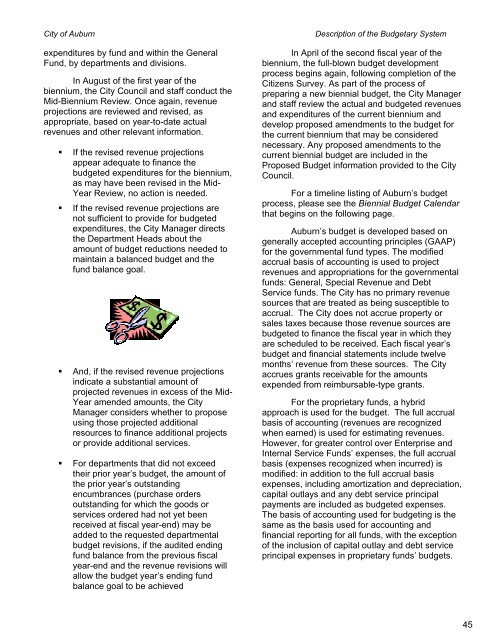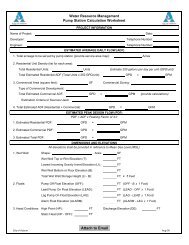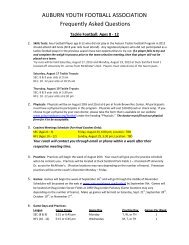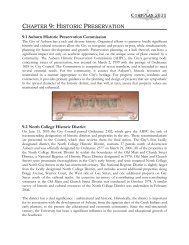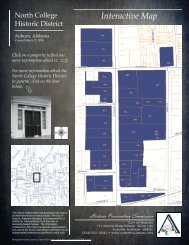Complete Document - City of Auburn
Complete Document - City of Auburn
Complete Document - City of Auburn
Create successful ePaper yourself
Turn your PDF publications into a flip-book with our unique Google optimized e-Paper software.
<strong>City</strong> <strong>of</strong> <strong>Auburn</strong>expenditures by fund and within the GeneralFund, by departments and divisions.In August <strong>of</strong> the first year <strong>of</strong> thebiennium, the <strong>City</strong> Council and staff conduct theMid-Biennium Review. Once again, revenueprojections are reviewed and revised, asappropriate, based on year-to-date actualrevenues and other relevant information.!" If the revised revenue projectionsappear adequate to finance thebudgeted expenditures for the biennium,as may have been revised in the Mid-Year Review, no action is needed.!" If the revised revenue projections arenot sufficient to provide for budgetedexpenditures, the <strong>City</strong> Manager directsthe Department Heads about theamount <strong>of</strong> budget reductions needed tomaintain a balanced budget and thefund balance goal.!" And, if the revised revenue projectionsindicate a substantial amount <strong>of</strong>projected revenues in excess <strong>of</strong> the Mid-Year amended amounts, the <strong>City</strong>Manager considers whether to proposeusing those projected additionalresources to finance additional projectsor provide additional services.!" For departments that did not exceedtheir prior year’s budget, the amount <strong>of</strong>the prior year’s outstandingencumbrances (purchase ordersoutstanding for which the goods orservices ordered had not yet beenreceived at fiscal year-end) may beadded to the requested departmentalbudget revisions, if the audited endingfund balance from the previous fiscalyear-end and the revenue revisions willallow the budget year’s ending fundbalance goal to be achievedDescription <strong>of</strong> the Budgetary SystemIn April <strong>of</strong> the second fiscal year <strong>of</strong> thebiennium, the full-blown budget developmentprocess begins again, following completion <strong>of</strong> theCitizens Survey. As part <strong>of</strong> the process <strong>of</strong>preparing a new biennial budget, the <strong>City</strong> Managerand staff review the actual and budgeted revenuesand expenditures <strong>of</strong> the current biennium anddevelop proposed amendments to the budget forthe current biennium that may be considerednecessary. Any proposed amendments to thecurrent biennial budget are included in theProposed Budget information provided to the <strong>City</strong>Council.For a timeline listing <strong>of</strong> <strong>Auburn</strong>’s budgetprocess, please see the Biennial Budget Calendarthat begins on the following page.<strong>Auburn</strong>’s budget is developed based ongenerally accepted accounting principles (GAAP)for the governmental fund types. The modifiedaccrual basis <strong>of</strong> accounting is used to projectrevenues and appropriations for the governmentalfunds: General, Special Revenue and DebtService funds. The <strong>City</strong> has no primary revenuesources that are treated as being susceptible toaccrual. The <strong>City</strong> does not accrue property orsales taxes because those revenue sources arebudgeted to finance the fiscal year in which theyare scheduled to be received. Each fiscal year’sbudget and financial statements include twelvemonths’ revenue from these sources. The <strong>City</strong>accrues grants receivable for the amountsexpended from reimbursable-type grants.For the proprietary funds, a hybridapproach is used for the budget. The full accrualbasis <strong>of</strong> accounting (revenues are recognizedwhen earned) is used for estimating revenues.However, for greater control over Enterprise andInternal Service Funds’ expenses, the full accrualbasis (expenses recognized when incurred) ismodified: in addition to the full accrual basisexpenses, including amortization and depreciation,capital outlays and any debt service principalpayments are included as budgeted expenses.The basis <strong>of</strong> accounting used for budgeting is thesame as the basis used for accounting andfinancial reporting for all funds, with the exception<strong>of</strong> the inclusion <strong>of</strong> capital outlay and debt serviceprincipal expenses in proprietary funds’ budgets.45


